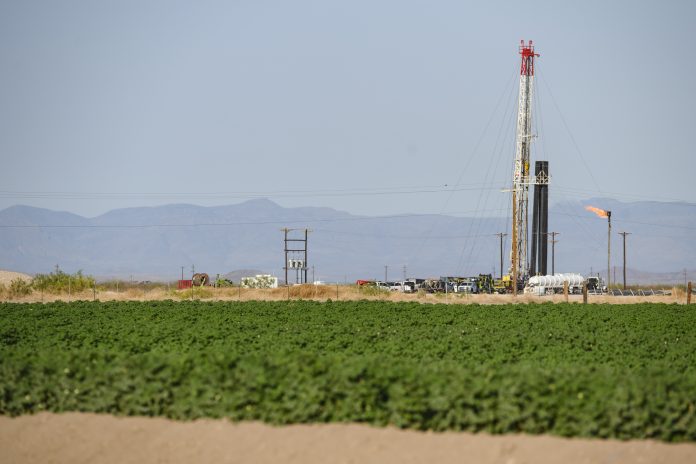An industry as big and powerful as energy may expect challenges almost as big and powerful as it is and that’ll continue in 2023.
The past year has been a great one in many respects with booming production and robust profits, but the obstructionist Biden administration, rampaging global demand, a weak investment scenario, shortages of workers, supply chain constraints, seismic issues and over-burdened refineries loom large as 2022 winds down.
However, Texas Railroad Commissioners Wayne Christian and Jim Wright and Texas Independent Producers & Royalty Owners President Ed Longanecker are confident the industry will prevail.
“Prior to the pandemic in 2019, Texas produced a record 1.8 billion barrels of oil and 10.1 trillion cubic feet of natural gas, making up over 40 percent of the nation’s entire production,” Christian said from Austin. “Then before the industry could recover, Joe Biden was elected president and he created roadblocks that added unnecessary regulatory uncertainty, discouraging growth and additional production.
“Under Biden, oil and gas have been under constant attack from stifling financial investments, increasing regulations and an economy on fire with inflation and supply chain issues. We’ve seen an overall energy inflation rate of 18 percent that everyday Americans still struggle with headed into the holiday season.”
But Christian was heartened to see his Republican Party regain control of the U.S. House of Representatives in Washington, putting up “a firewall against Biden’s radical ‘keep it in the ground’ agenda.
“I look forward to their proposals aiming to restore Texas to its previous production levels,” he said. “We’ve been blessed with an abundance of oil and gas that pays billions in taxes and royalties, which is why the Texas Legislature will have a $27-billion surplus to work with and hopefully provide relief to taxpayers instead of tax increases like other states.”
Longanecker said ‘22 was the year when the world gained a new appreciation for having a reliable, secure supply of energy and Texas rose to the challenge to keep prices affordable at home and help allies abroad.
“Seventy-four percent of all U.S. exports went to Europe in the first of half of 2022 and ports along Texas’ coast like Corpus Christi provided essential infrastructure to meet European demand,” Longanecker said. “In the first half of ‘22, 90.1 million tons of liquefied natural gas moved through Corpus.
“Higher commodity prices led to record oil and gas production in Texas. Oil output in the Permian Basin alone is set to hit a record of 5.5 million barrels per day in December.
“This speaks directly to the ingenuity and grit of Texas producers as the industry faced a multitude of challenges this year including workforce shortages, capital constraints, supply chain issues, inflationary pressures and an adversarial federal regulatory environment.”
Longanecker said the U.S. sorely needs more refineries, having processed 19 million barrels of oil per day in 2020 but only 17.9 million bpd this year as some old refineries were shut down for repairs and others dismantled.
“President Biden’s record releases from the Strategic Petroleum Reserve endanger American security and they are a short-sighted fix for energy prices,” he said from Austin. “The SPR reached its lowest level since the 1980s in October after over 100 million barrels were released.
“To truly address energy prices, the world needs a reliable, ongoing increase in its energy supply, but for 2023 we face a serious challenge. Global demand will continue to outpace supply. In order to address record demand and increase production, we need investment in infrastructure and thoughtful, collaborative, energy-friendly policies.
“With the right policies in place, Texas can continue to make a meaningful contribution to our global energy shortage. Unfortunately, the Biden administration continues to finger-point and pursue policies that put further pressure on supply and drive prices higher, adding to recessionary concerns and the cost of goods and services for Americans.”
Wright said ‘22 “was a great year for the Texas oil and gas industry overall with increased production, a record $11 billion dollars in production tax revenues paid to the state so far and a continued decline in our percentage of flaring.
“I’m particularly proud of how the industry fared in the face of so many challenges from new weatherization efforts passed as a result of Winter Storm Uri and a federal administration that continues to implement draconian rules and regulations with the seeming intent to end domestic oil and gas production,” Wright said.
He also cited pressures of responding to increased global demand for Texas-produced natural resources as a result of the war in Ukraine.
“Our natural resources will continue to be a driving force for our economy and our importance on the world stage will only increase,” Wright said. “But if there is one thing I know about this industry, it is that the issues and challenges we face may change, but they never go away.
“The Texas oil and gas industry has always proved itself resilient and adaptable, but our challenges include, first and foremost, the federal government’s continued efforts to attack domestic oil and gas production, particularly in the Permian Basin. Other challenges at the top of my mind include more effectively curtailing seismic events (earthquakes) and finding alternatives to the injection of produced water.”
Wright said additional obstacles are workforce shortages and supply chain issues. “So I think resiliency and adaptability will be more important than ever,” he said.
“The investment dynamic has dramatically changed over the last few years as investors approached this upswing with more discipline. To what extent that’s a response to the increased focus on environmental, social and governance issues, I couldn’t say.
“But it is a marked change from the ‘drill now, figure the rest out later’ mentality that has been prevalent in the past.”




